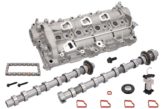
With almost 30 years’ experience in the oil and lubricants industry, Morris Lubricants’ Automotive Product Manager, Adrian Hill, is perfectly placed to provide his expert insight and analysis.
Q. I was recently tempted to refill the sump of a stellar mileage 3-Series BMW petrol engine with some 10w-40 fully-synthetic lubricant, designed for high performance 4-stroke motorcycles. How disastrous might this have been?
ADE’S ANSWER:
The main issue is that motorcycle engine oils potentially have to deal with wet or oil immersed clutches in the motorcycle transmission. Too many friction modifiers, used in PCMOs to help reduce friction and improve fuel efficiency, can cause motorcycle clutches to slip. If you look at the specifications listed for a motorcycle oil, you will see references to JASO (Japanese Automotive Standards Organisation), particularly JASO MA1, MA2, MB. These refer to a certain level of wet clutch protection.
But let’s get back to your question. As 4-stroke motorcycles are all petrol fuelled, they have a good level of petrol engine performance, and you will see API or American Petroleum Institute classifications for petrol engines quoted – i.e. API SJ, API SL. Now if your BMW has been to the moon and back and assuming it is no longer under manufacturer’s warranty or under a service contract agreement, the engine would happily survive without anything happening of a catastrophic nature.
Of course fully fledged PCMOs have a lot of extras compared to a motorcycle engine oil and usually display a list of OEM engine oil specifications, such as BMW, VAG, Mercedes Benz, etc. which ensure maximum levels of protection for these engine types. And of course, as stated above, if a vehicle is under warranty or a service contract, it is essential to ensure the oil is fully qualified.
So in summary, although a motorcycle engine oil would not do any harm in the short term, we would always recommend the use of properly qualified PCMO to ensure you get maximum life and minimum downtime for the engine.










